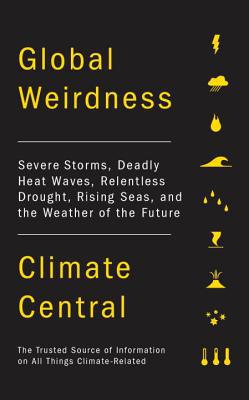

| GLOBAL WEIRDNESS Severe Storms, Deadly Heat Waves, Relentless Drought, Rising Seas, and The Weather of the Future Emily Elert Michael D. Lemonick New York: Pantheon Books, August 2012 |
Rating: 5.0 High |
|||
| ISBN-13 978-0-307-90730-1 | ||||
| ISBN-10 0-307-90730-9 | 214pp. | HC/GSI | $22.95 | |
| Page 7: | "It ultimately doesn't matter whether there's a black hole in the center of the Milky Way or not." |
| For sufficiently small values of "ultimately". That black hole is currently inactive, like a dormant volcano. If it becomes active, it would send a burst of light and particle radiation our way. Every galaxy has a black hole, but no one knows why some are active while others aren't. Ours lies about 20,000 to 30,000 light years away. If it flared up we'd get the light first. That would probably not be dangerous. The particle radiation would be more of a concern. Fortunately, that would fall behind the light on its journey, so we'd have some time to prepare. |
| Page 43: | The pie charts comparing America's carbon emissions to those of nonindustrialized countries. |
| These charts belong back in chapter 10. |
| Page 57: | "(and, despite a common urban legend, possibly invented by dentists, the acid in Coca-Cola can't dissolve a tooth overnight, either)." |
| It's a nit, but this doesn't conform to American style: S/B "overnight, either.)". |
| Pages 66-67: | "It also turns out that warm water expands faster than cold water, which means that rising temperatures will cause the oceans to expand faster and faster." |
| I never heard this. Even if it's true, this prediction is likely overstated. |
| Page 68: | "...and the ice sheets are miles wide at their thickest." |
| Word choice: S/B "miles deep". |
| Page 94: | "Places where there were no ice sheets—the bottom of the sea, for example—are sinking, to compensate."" |
| It does make sense that when the weight of ice comes off the continents, and they rise (isostatic rebound), sea-bottom sinking would occur because the oceans are now heavier. But, like astrophysics, geology doesn't always follow common sense. Rocks have different strengths, and the distribution of weight per square meter would be different. |
| Page 105: | "Voles—a type of small, round rodent—are an especially vital part of the ecosystem..." |
| Small, I'll buy. But why "round"? Are they somehow rounder than other rodents? |
| Page 184: | "When, in the 1980s, the plant exploded and burned at Chernobyl..." |
| Everybody should know the Chernobyl disaster took place in 1986. Why not be more specific? |
| Page 183: | Chapter 57 "Nuclear Energy Is Essentially Carbon-Free. That Doesn't Mean It's Without Issues" |
| True, but it also doesn't mean those issues apply to all conceivable reactor designs. This chapter never mentions those new designs. |

 To contact Chris Winter, send email to this address.
To contact Chris Winter, send email to this address.